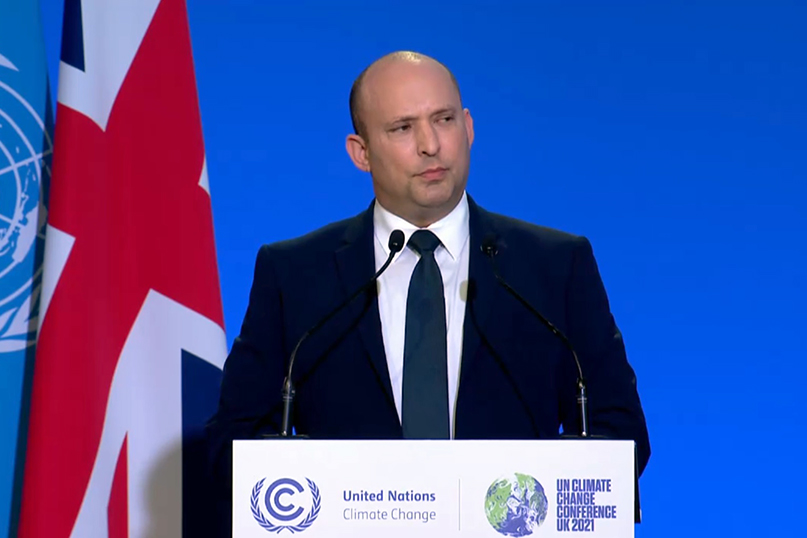
By Alex Traiman
(JNS) The current Israeli government led by Israeli Prime Minister Naftali Bennett is taking the issue of climate change more seriously than ever before. Israel has brought a delegation of 140 members to the 26th U.N. Climate Change Convention (COP26) in Glasgow, Scotland.
Bennett pledged this week that Israel will no longer burn coal for electricity by 2025, and committed Israel to be a net-zero carbon economy by 2050. While the pledges, particularly the latter, will be extremely difficult for a nation that currently relies on abundant sources of natural gas, the net result will likely be negligible compared to significantly larger countries.
Speaking at the COP26 plenary, Bennett noted, “Our carbon footprint may be small, but our impact on climate change can be mighty.” He called on Israeli entrepreneurs to “be the game-changers” and harness their creativity for climate solutions, calling the Jewish state the “climate innovation nation.”
In particular, Bennett announced the launch of an official task force called “the Green Sandbox” to provide funds to entrepreneurs and cut bureaucratic red tape.
The prime minister noted, as did other plenary speakers, that fighting climate change will require “new inventions and new technologies that have not yet been imagined.”
In addition to the allocation of government funds, venture-capital firms are beginning to turn towards climate solutions.
Just last week at the Middle East Green Initiative Summit in Riyadh, Saudi Arabia, Larry Fink, the CEO and chairman of Blackrock—the world’s largest asset manager—expressed his belief that “the next 1,000 unicorns—companies that have a market valuation over a billion dollars—won’t be a search engine, won’t be a media company; they’ll be businesses developing green hydrogen, green agriculture, green steel and green cement.”
Such a proclamation will certainly attract the attention of Israeli entrepreneurs who dream of the coveted “exit.”
According to Itamar Weizman, partner and head of climate investments at Firstime Ventures, the convention itself represents “a huge economy.”
“There are a lot of global trends in sustainable thinking that are brought forth here in terms of preventing deforestation, in terms of bringing solutions for water tech, in terms of bringing better, renewable energy to the world, in terms of weaning people off of fossil fuels, in terms of better science, better technology,” he explained.
“There is more than $7 trillion worth of investors that are coming to COP,” Weizman told JNS.
Firstime Ventures itself hopes to become a major player in funding Israeli climate technologies. At COP26, the company announced the launch of its own $100 million venture-capital fund for Israeli startups.
“We are in Israeli companies that are promoting solutions for climate change, from renewable energy to precision agriculture to water solutions,” he said. “Israel has a lot of value to bring to the world in terms of climate technologies.”
Firstime announced that “billionaire investor, Jonathan Kolber is joining our fund, and we closed the fund. We’re deploying a $100 million in about 15 Israeli companies.”
Main Photo: Israeli Prime Minister Naftali Bennett addresses the U.N. Climate Change Convention in Glasgow, Scotland, on Nov. 1, 2021. Source: Screenshot.







 Southern New England Jewish Ledger
Southern New England Jewish Ledger













